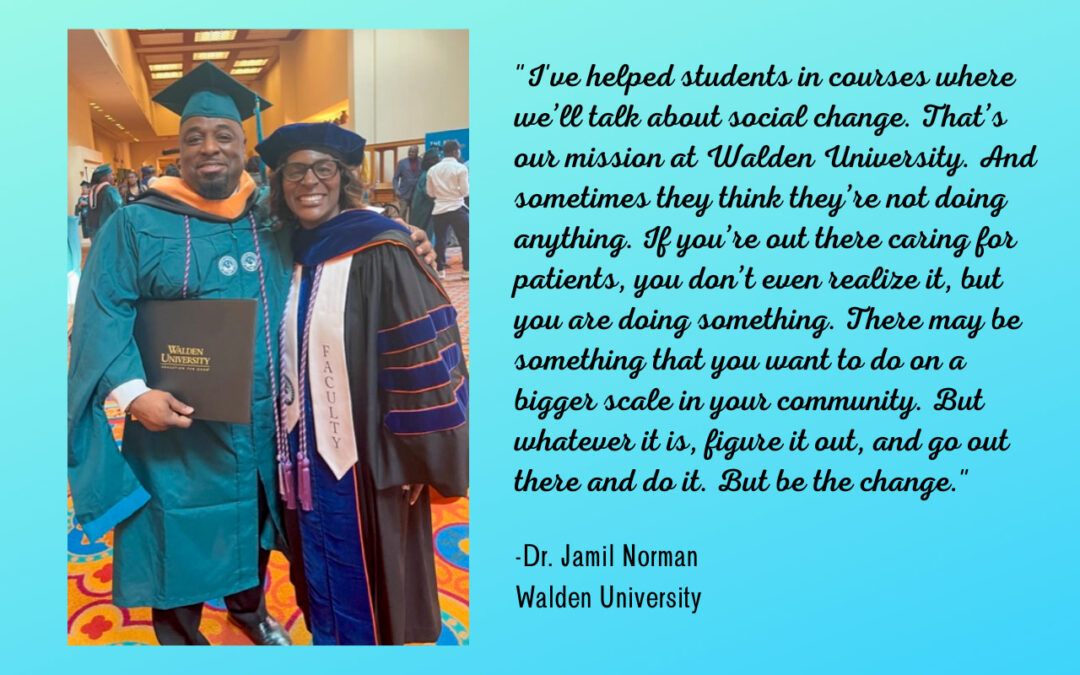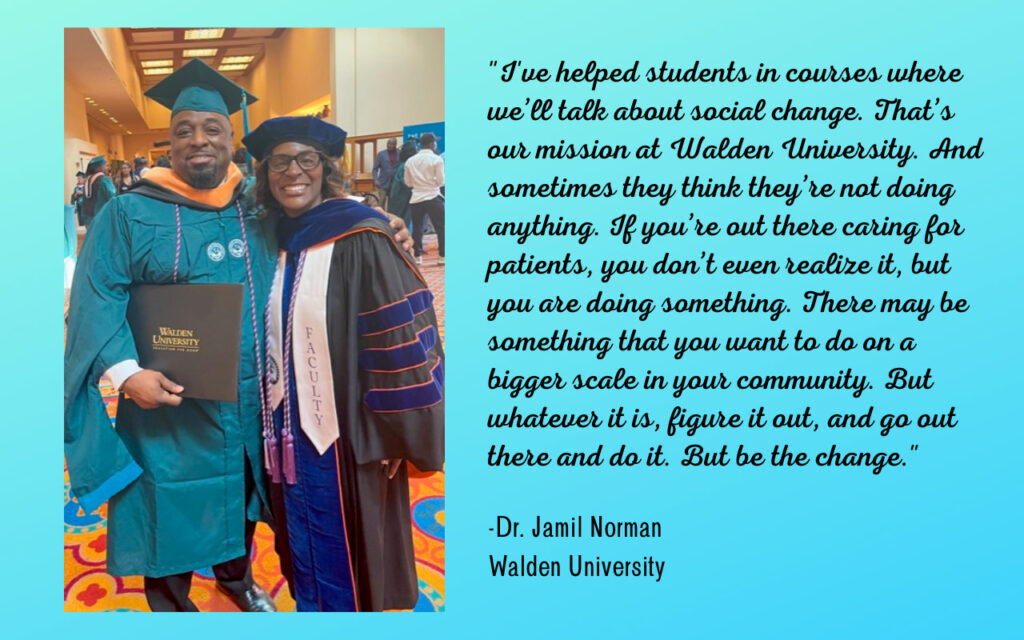Dr. Jamil Norman is the Tempo Academic Program Coordinator for the RN to BSN Program at Walden University and a certified nurse educator with over twenty years of experience as a registered nurse and over fifteen years in higher education.
Throughout her career, Dr. Norman has served as an agent of social change in the roles of educator, researcher, and mentor. She is a member of the American Association of Colleges of Nursing Diversity, Equity, and Inclusion Leadership Network. As a nurse researcher, Dr. Norman works to advance the body of evidence on pregnancy-related health disparities among African American women.
Dr. Norman is an important nursing leader, and we’re pleased to profile her as we celebrate Black History Month with the Black Nursing Leaders Series 2023.
In February, we’ve been highlighting healthcare leaders who are prominent figures in their organizations and are making transformational impacts in nursing.
Meet Dr. Jamil Norman, the Tempo Academic Program Coordinator for the RN to BSN Program at Walden University
Talk about your career path and how you ascended to that role.
So when I started, I worked as a labor and delivery nurse at the bedside. And so I worked as a labor delivery nurse for three years before I decided to get my master’s degree in nursing education. After I got my master’s degree, I started working at Grambling State University, and I taught women’s health because that was the only area I ever wanted to work or teach. I love women’s health and everything with laboring women and babies until it’s time to hand them off to somebody else. So then I taught clinical and women’s health for several years before I decided to get my PhD in nursing. And that’s kind of when I transitioned into more leadership. I was the BSN program director at an HBCU where I taught before transitioning to online teaching at Walden. Between that was having babies and I needed to be more available for my family, yet still having a career, so I transitioned into full-time on my teaching, which I call a work-life juggle, not a work-life balance. I could still advance my career and pick up my babies from school. And so it’s been wonderful. I get to do a little bit of research and also teach and have leadership in management for being the coordinator of our program.
You mentioned that you always wanted to work in women’s women’s health. Is that what inspired you to become a nurse?
I wanted to be a pediatrician until it was time to take all my biology courses. In my first semester of school, I took a micro and cellular biology class and scored a 32% on a test. I thought I was going to faint! I thought, oh, this must be a 32 out of 50. But it was an F. It was the worst grade I’d ever gotten in my education, and I quickly dropped that course and talked to family and friends to figure out if this was really what I wanted to do.
My sister is also a nurse, and when I talked to her, what I thought doctors were doing was actually what nurses were doing. So that’s when I pursued nursing, but I always knew I wanted to be in medicine. And in fact, I went from I’ll be a pediatrician to I’ll be a pediatric nurse. However, when I went through that rotation, I thought, no, this isn’t for me. And I got pulled down to the labor and delivery unit when I was a patient care tech, going through nursing school, and fell in love. I couldn’t believe that I loved it. And that was it. I was sold. It was the trifecta. And being with mom during the happy time. I love that. Women, you come into the hospital for a happy moment, right? When you’re in the hospital, you’re not feeling well, you know, something’s wrong. This is the hospital’s main area where you come in happy. And, yes, there are sad times, but most of the time, you leave happy. That was it. I was sold after that. I never wanted to do anything else at the bedside. After going through nursing school, I was like, nurses can do so much. Nurses do just so much that I love that about the profession. You can do anything in nursing.
What are the most important attributes of today’s nursing leaders?
Number one, for me, is always going to be passion. Because if you are not passionate about what you do, especially, you know, passionate about the profession of nursing, the hard days, they’re going to make you give up, and you’re not going to want to do it. I’ve seen it, some people go into nursing for money, but they don’t last. So you have to love what you do. And then it’s just accountability. And you’ve got to be a leader. You must be able to show up for those depending on you. And then the other thing right now, which is heavier in my mind, is you have to be ethical. And just everything that’s going on with the fake nursing degrees through Florida. I was heartbroken. When I saw that news, this wasn’t very good. And we’ve got to be able to protect the public. So you must have high ethics and moral standards to be a good nurse leader.
What is the most significant challenge facing nursing today?
It is burnout. Burnout has always been there. But after the pandemic, it’s challenging to be a nurse. Now, you’re short-handed. Sometimes you’re not very trusting of how people care for you whenever you’re in the workplace. And so burnout has got to be the biggest challenge. We have a lot of nurses who are educated to be nurses who are not working. And it’s because, you know, I’m not sure that we’ve always created the best environment for nurses to be able to, to live and to work and do what they, you know, love to do. So definitely, for me, the number one challenge is burnout, and at the bedside, as educators, the shortage is still there. For educators, when you have large classes, it’s exhausting.
What does it mean to you to be a nursing leader, and how are you making a difference?
The biggest thing for me is to embrace some of the changes occurring in the profession. Some nurses will tell you, don’t be a nurse. And I would never be that person because I think nursing is a wonderful profession. So I’m always trying to bring others into the profession and teach them to care for themselves. There are things that you can do to make sure that you don’t get burned out. I always tell my students if they don’t like what they’re doing, then change it. Don’t be afraid to change. Don’t just stay on at that job because you’re comfortable. If you’re tired, sometimes just learning something new and being in a different environment will bring back that passion you had when you first started and help with burnout and self-care. No one gets any awards for not using their days off. I tell everybody to use all their days and vacations, take time off with the family, and put the work aside so when they come back, they’re a better person for the people they work with and those care for.
What nursing leader inspires you the most?
I have had the pleasure of having a magnificent mentor throughout my nursing career. Her name is Dr. Afua Arhin, and I met her when I had just started as a nurse educator. She has been so impactful on me because she was the first African American nurse with a PhD that I’d ever met. She came in and taught me so much about effective leadership. She told me to get my PhD, and at that time, I was like, Are you crazy? PhD? If she told me to jump off the bridge, I’d be like, yes, we’re jumping off the bridge, and it will be fabulous. She’s just that encouraging, but she has been with me throughout my career. She helped me to go out and present at my first conference. I’d never been a presenter at a conference before. I always thought that was what somebody else did. It wasn’t what I did. And she said I have information and research to share. She just held my hand through being the educator in the classroom and developing me as a professional nurse, researcher, scholar, and presenter. And she still does that. Currently, she’s working on a Fulbright and researching in Ghana.
She has just been when there is anything I want to do professionally, and I always bounce ideas off of her. And it’s just been wonderful to have someone like that in my corner throughout these years. And the ways she’s helped me to be, she is for me to others. If she’s helping me, I’m helping to mentor students and lead them throughout their careers. So I learned how to be a mentor from having an amazing mentor.
What inspirational message would you like to share with the next generation of nurses?
My thing is always to be the change. I always tell everyone, there are many things that people will complain about, they don’t like, but they’re not doing anything about it. If you want something to change, you have to be the change. You got to get out there and make a difference, whether at the bedside, as an educator, as a researcher, or in whatever avenue you want to make an impact. So get out there and do it. Even if it seems too small, or it might even be too big, start chipping away at it, and get out there and be the change, even if it’s just for one person. I’ve helped students in courses where we’ll talk about social change. That’s our mission at Walden University. And sometimes they think they’re not doing anything. If you’re out there caring for patients, you don’t even realize it, but you are doing something. There may be something that you want to do on a bigger scale in your community. But whatever it is, figure it out, and go out there and do it. But be the change.
- Meet a Champion of Nursing Diversity: Kendra Coles - April 3, 2024
- Meet a Champion of Nursing Diversity: Barbara Bosah - March 13, 2024
- Tune Into New Podcast Series: Conversations About Health Care Delivery in the United States - March 7, 2024




